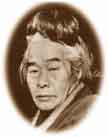
1871-1948
Chronology of the Life
of Onisaburo Deguchi,
Co-Founder of the Omoto religion
1871-1948 |
Chronology of the Life
of Onisaburo Deguchi, |
| 1871 | Onisaburo Deguchi born in Anao as Kisaburo Ueda.
|
| 1874 | Onisaburo placed by his mother Yone in care of her mother Uno, an erudite women versed in poetry an the esoteric science of kotodama. Uno was a daughter of Kodo Nakamura, a kotodama scholar, and had a great influence on her grandson.
|
| 1883 | Onisaburo becomes a primary school teacher at age 12.
|
| 1897 | Kichimatsu Ueda, Onisaburo's father, dies at age 53. Onisaburo falls into a life of despair and dissolution and begins drinking heavily.
|
| 1898 | Onisaburo, during New Year�s performance of a ballad drama with shamisen accompaniment, is dragged from the stage and severely beaten.While recovering in a shed, a man dressed in Western clothes appears to Onisaburo and the latter follows him to Mt. Takakuma near his home where he spends a week.Onisaburo becomes divinely possessed on Mt. Takakuma and undergoes an intense spiritual experience.Onisaburo meets Nao Deguchi, foundress of Omoto religion.
|
| 1899 | Onisaburo meets Nao Deguchi for second time in Ayabe.
|
| 1900 | Onisaburo marries Sumiko Deguchi and takes the name of Onisaburo Deguchi.Onisaburo involved in power struggle with senior followers of Nao.
|
| 1906 | Onisaburo leaves Ayabe to acquire the learning and skills necessary for the development and expansion of Omoto and to create an outlet for its teachings.
|
| 1908 | Onisaburo rejoins Nao in Ayabe and sets about fixing the form of Omoto rituals, gives lectures, and sends out lecturers to conduct missionary work.
|
| 1918 | Onisaburo spens a great deal of energy establishing a missionary base in Tokyo and recruiting for Omoto famous figures of the day as well as members of the aristocracy.
|
| 1920 | Omoto buys Taisho Nichinichi Shimbun, one of Japan�s largest newspapers, and uses it to proselytize the religion.
|
| 1921 | First Omoto Incident in which the authorities brutally supress the Omoto religion. Onisaburo is jailed being charged with lese majeste.Onisaburo freed on bail following 126 days of imprisonment.Onisaburo begins dictating Reikai Monogatari after being released on bail.
|
| 1923 | Onisaburo orders one of his attendants to begin learning Esperanto and Omoto begans to emphasize internationalism.
|
| 1924 | Onisaburo and small party including Morihei Ueshiba, founder of aikido, secretly leave for Mongolia to establish a Utopian nation with religious freedom.
|
| 1925 | Jinrui Aizenkai organization established under Omoto auspices with great fanfare. Period of intense missionary and propaganda activities.
|
| 1932 | Budo Senyokai established by Onisaburo with Morihei Ueshiba as its first chairman. Martial arts, primarily Ueshiba's jujutsu, actively practiced in Omoto chapters all over Japan.
|
| 1934 | Showa Shinseikai established by Omoto to exalt the Sacred Imperial Way and to resolve to practice the spirit of Jinrui Aizen, that is, the love of mankind.
|
| 1935 | Omoto religion: at the height of its popularity claiming more than two million followers.Second Omoto Incident begins with well orchestrated police raid on Kameoka and Ayabe Omoto centers with no forewarning.
|
| 1936 | Onisaburo, his wife Sumiko, and numerous other Omoto leaders imprisoned after a sham trial.
|
| 1942 | Onisaburo, Sumiko and Uchimaru Deguchi released from prison on bail
|
| 1946 | Onisaburo leads a quiet life devoting much of his time to pottery and ceramics for which he became quite well-known in the field of art following his death.
|
| 1948 | Death of Onisaburo Deguchi following a stroke. |